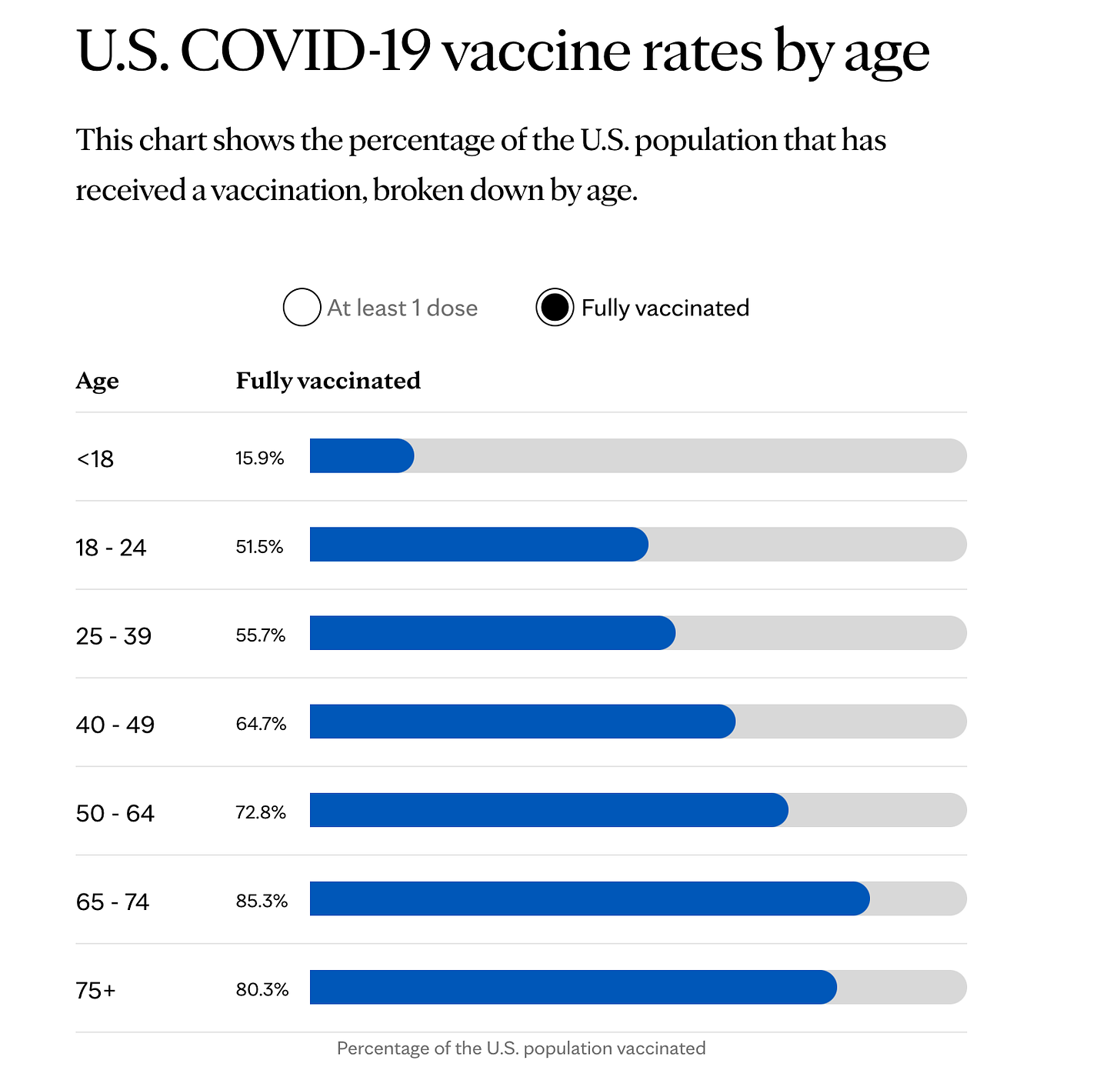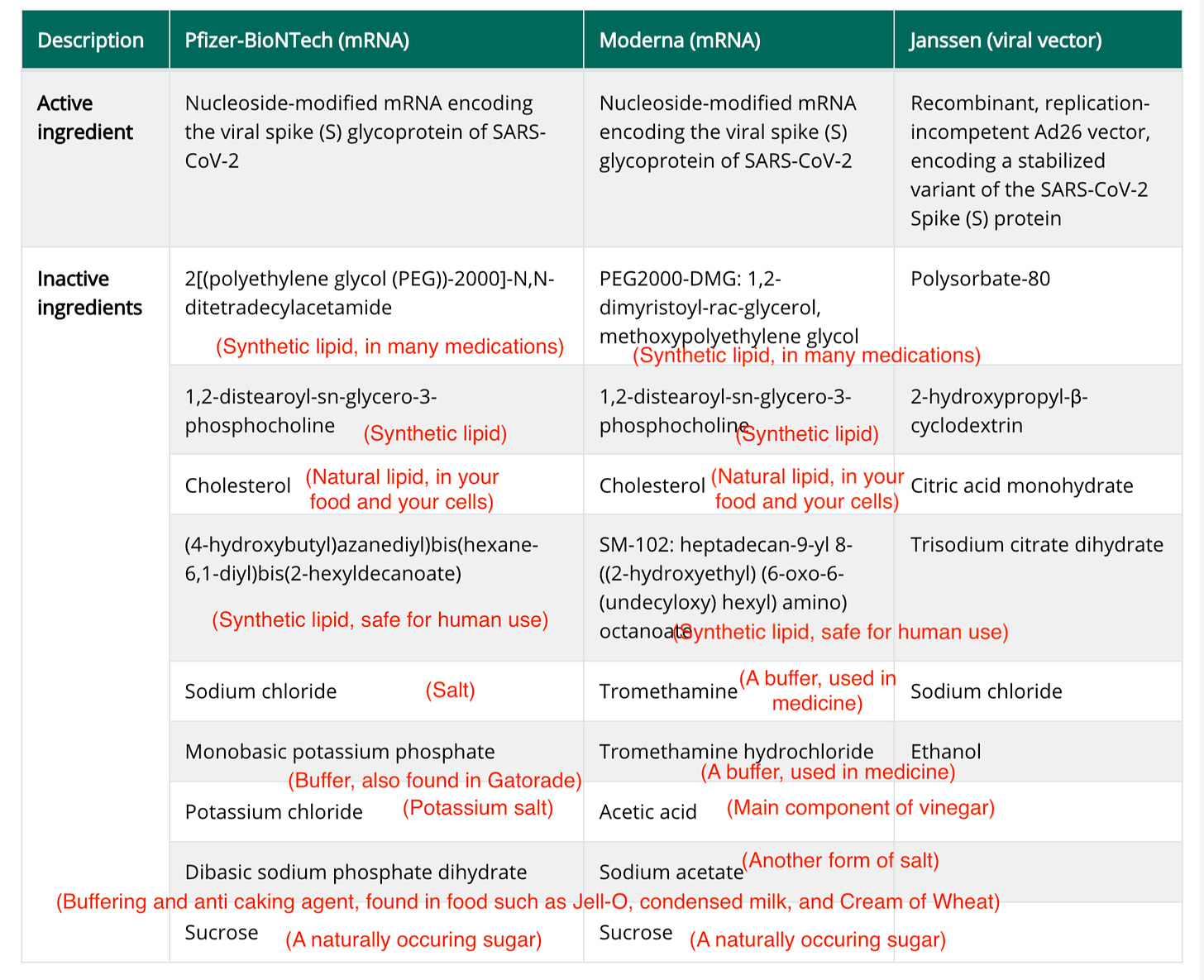How Can We Be Sure Vaccination against COVID-19 Doesn’t Cause Infertility?
There are many reasons to know it is safe, and none to believe it isn’t!
Despite the fact that fertility experts recommend vaccination against COVID-19 and there are several studies showing no concern for fertility, many people still harbor fears. After all, how can we in medicine be so sure that a vaccine that has been available for less than two years won’t cause a problem 10 years down the road? Wouldn’t we need a 10 year study to prove that?
The answer is no, we don’t need a 10 year study. And I am going to explain why. I am going to limit this discussion to the mRNA vaccines, Pfizer-BioNTech and Moderna, for simplicity.
This is a long post, so for those who just want the summary, skip to the end with the header, “Putting it All Together.”
Researchers aren’t just throwing drugs against a wall in the lab to see what sticks.
They know the molecular structure of each chemical and have a good idea how it might interact with cells before it even gets to animal trials, but animal trials are still essential because how a chemical acts in the body may be very different than in a petri dish. The unpredictable can and does happen.
From a fertility standpoint, researchers typically administer the drug, usually in much higher doses than would be used for humans, to animals and then look at the brain and the reproductive organs to see if the drug concentrates in these tissues and for any negative effect. This information means researchers know which drugs might theoretically impact fertility early on in the process, and if fertility concerns exist, the drug is abandoned unless the benefit outweighs that risk. One example is chemotherapy drugs. Some can be very toxic to the immature eggs in the ovary, leading to infertility, but these drugs may also be the only option to treat a specific cancer.
And yes, these studies also happened with the COVID-19 vaccines.
For a medication to cause infertility it would have to do one or more of the following: affect the part of the brain that signals the the ovary, damage the developing eggs in the ovary, severely damage the lining of the uterus (endometrium), or cause the cervical mucus to become hostile to sperm (basically creating a chemical road block for the sperm to meet an egg). And this would have to happen from just one or two injections of very tiny amounts (Moderna 0.5ml and Pfizer-BioNTech 0.3 ml). The vaccines are 0.1 teaspoon or less! So on top of everything this mystery chemical would need to be incredibly potent.
The lining of the uterus (endometrium) regenerates after each menstruation, so this is not a site of potential damage by the vaccine (yes, there could be short term changes in menstruation from the immune response, but nothing permanent nor anything that impacts fertility, you can read more about that here). Cervical mucus is constantly produced, so there is no way one or two injections could have a permanent effect. Currently, contraception that uses a progestin (a synthetic form of progesterone), works by affecting the cervical mucus. When the drug is stopped, the cervical mucus reverts to normal. This explains why nothing in the vaccine can possibly permanently affect the endometrium or mucus.
This leaves us with the possibility of directly affecting the ovary or how the brain signals the ovary. There are medications, some chemotherapy drugs as previously noted, that are known to have permanent effects on the ovary. This happens because chemotherapy is cytotoxic (meaning it kills cells, and unfortunately, this also includes the immature eggs in the ovary). We know this can’t happen with either mRNA vaccine as no ingredient in the vaccine is cytotoxic in this way. Also, this effect happens fairly quickly after exposure, so if any vaccine ingredient had this impact on the ovary it would have already been identified in animal studies and in the first studies on humans. Furthermore, this cytotoxic impact is accompanied by premature menopause, which would have been identified in the early studies and given the number of people younger than 50 who have been vaccinated, we would have widespread reports of premature menopause if this effect on the ovary existed, but we don’t.
What about the brain ovary connection? There are chemicals called endocrine disruptors (the most notable is bisphenol-A or BPA) that can have an impact here over time. Endocrine disruptors are not hormones, but can act like hormones on tissues. Cumulative exposure to certain endocrine disruptors has been linked with infertility and an earlier menopause, however, there are no endocrine disruptors in the mRNA vaccines and again, with endocrine disruptors it is cumulative exposure that can cause a problem.
We would be concerned about a vaccine impacting fertility if it were cytotoxic or an endocrine disruptor, and COVID-19 vaccines are neither.
Next We Look at The Ingredients
I know people are skeptical, so let’s look at all the ingredients. The table below is from the CDC and shows all the ingredients. I have added more explanations in red.
mRNA
Both the Pfizer-BioNTech and Moderna vaccines contain mRNA or messenger ribonucleic acid. This is the active ingredient. The mRNA carries the genetic code to make the spike protein found on the surface of SARS-CoV-2 (the virus that causes COVID-19). The body then makes these spike proteins, but then quickly recognizes these proteins as foreign, so it makes antibodies to destroy the spike proteins. If you are then later exposed to the COVID-19 virus, you now have antibodies that can fight the virus. Some things to know about the mRNA:
mRNA can enter cells, but not into the nucleus where the DNA is housed. As the mRNA can’t enter the nucleus it is impossible for it to alter DNA.
mRNA is degraded and removed by the body within a few days. So it can’t hang around to cause infertility (not that there is even a way that it could).
The spike protein is gone within a few weeks.
The antibodies hang around, but they don’t cause infertility. No antibodies from a vaccine or against a virus have previously been shown to cause infertility. Also, if these antibodies from the vaccine cause infertility, then antibodies naturally generated if you catch COVID-19 from another person would also cause infertility. Finally, antibodies can’t lay in wait only causing infertility years later. That just isn’t biologically plausible.
The antibodies produced by vaccination cannot mistakenly attack the placenta. I have covered that previously in this post.
The Lipids
mRNA is fragile and your body wants to destroy it. For the mRNA to temporarily evade the body’s defenses and enter the cells it needs a protective coating, and this is where the lipids come in. Lipids are fatty molecules that coat the mRNA, protecting it and helping it slide into cells. The Pfizer-BioNTech and the Moderna vaccine have 4 lipids each. There is no way a single dose of these lipids could affect the brain or ovaries to cause infertility.
Both vaccines have cholesterol, 1,2-distearoyl-sn-glycero-3-phosphocholine (DSPC), and PEG 2000.
Cholesterol is a naturally occurring lipid in food and is a component of every cell in the body, so clearly not a concern.
DSPC is a synthetic (made in the lab) phospholipid that is very similar to lipids we have in our bodies. It is used in several other medications, meaning it has a proven, safe track record.
PEG2000, is also a synthetic lipid. This is in several medications in use. For example, it is in depo-provera, an injectable contraceptive and we know that depo-provera is not associated with infertility down the road. The amount of PEG2000 in depo-provera is 28.5 mg and there is only 0.05 mg in the Pfizer-BioNTech vaccine and with depo-provera that amount is injected every 12 weeks, often for years. So there is no possible way the much lower amount of PEG2000 in the COVID-19 vaccines can cause infertility.
The 4th lipid is different for each of the vaccines.
SM-120, which is in the Moderna vaccine, is proprietary.
(4-hydroxybtyl)azanediyl)bis(hexane-6,1-dily)bis(2-hexyldecanoate), which is in the Pfizer vaccine.
We know these new lipids are safe because while they seem new to us, there are decades of research behind them. The wrong formulation of lipids could be harmful (not for fertility reasons, just harmful in general), so it took years of study to find ones that were safe and could also do the very specific job that was needed to make an effective vaccine. You can read more about the lipid research here if you are interested. These chemicals have been injected repeatedly into animals over years, and then in human volunteers, in the quest to find ones that could be used safely and effectively.
In animal studies less than 0.1% of the amount of lipids in the vaccine were found in the ovaries (tiny amounts would make it to all tissues, but as expected most went to the muscle, meaning the site of injection, and the lymph nodes). You can read more about that data here. There is simply no safety concern.
Other Ingredients
All the remaining ingredients are stabilizers, meaning they keep the vaccine ready for use. They are tiny amounts of salt, sugar and other chemicals that are essential for the body to function or are already in widespread use by humans. For example, some are in Gatorade, and Jell-O, and in medications that have been used with a long track record. Humans have multiple exposures over years or even a lifetime, so if they caused fertility issues, we would already know.
No Drug or Supplement has 10 Year Clinical Trials on Fertility
That’s right. All drugs that go to market follow the same route as the COVID-19 vaccines. So the antibiotic you take for an infection or the new medication for high blood pressure didn’t go through 10 years of human trials to look for fertility concerns before it was made available to the public. The drug was studied in the lab and then on animals to look for any sign of fertility concerns, just like the COVID-19 vaccines. If a drug is cytotoxic, like chemotherapy, or an endocrine disruptor, meaning it has the potential to impact fertility, more studies would be needed to get FDA approval and the drug would have an appropriate warning label.
If the people spreading disinformation about the COVID-19 vaccine and fertility are so concerned about fertility, why aren’t they concerned about literally every other drug? And why aren’t they concerned about supplements, which are sold with none of these safety studies or even basic data?
Because it’s not about drug safety, it’s about scaring people away from the vaccine, usually for some political or financial agenda, like selling supplements.
No One Scaring You About the Vaccine Offers a Plausible Mechanism for Infertility
This is an important point. They are basically saying “something” might happen to cause infertility, but they never give a plausible “something.” It’s a bit like those religious cult leaders who claim the world is ending on a specific date due to the “wrath of God” (the specifics are never given).
We actually do know enough about how the human body works to say the plausibility of vaccines causing infertility is as likely as those same vaccines giving people super human strength. Both are scientifically equally likely to happen, but then why doesn’t anyone seem to discuss superhuman strength?
Also, you will never see people making these claims write a detailed paper like this one offering a scientifically plausible explanation for the vaccines causing infertility. Because they can’t.
Fertility Fears and Vaccines is a Common Anti-Vaccine Trope
We have been here before, which is important to know. We have seen unfounded fertility fears with both the human papilloma virus (HPV) vaccine and the tetanus vaccine. Anti-vaccine predators know fertility myths are sticky, which is why they use them. I get they are believable. After all, the drug DES (diethylstilbestrol) which was given to women during pregnancy ended up causing severe issues for their daughters with whom they were pregnant with at the time, and these health problems were not diagnosed until many years after they were born. Some of the complications included malformations of the reproductive tract that affected fertility and cancers of the cervix and vagina. What is equally important to note is that DES is a synthetic estrogen, meaning a chemical that has the potential to affect the developing reproductive tract, and the lead researcher on the team who invented DES, Dr. Dobbs, specifically warned against its use in pregnancy. It was also invented in 1938, before the drug safety standards of today.
Big Chemical Names Sound Scary if You Don’t Speak the Language of Science
This quote from Michale Pollan has done a lot of damage, "When you pick up that box of portable yogurt tubes, or eat something with 15 ingredients you can't pronounce, ask yourself, "What are those things doing there?” He’s of course not the only one, “Don’t eat what you can’t pronounce” has become a meme. But hey, I can’t pronounce Worcestershire Sauce, does that mean it is unsafe and that I shouldn’t eat it. I can pronounce arsenic, does that make it okay? Of course not! The chemical name for water is dihydrogen monoxide, but calling it that doesn’t change that it is water. If we gave the big chemical names in vaccines more consumer-friendly monikers that wouldn’t change their structure or their safety. And here is a very important note, big long chemical names aren’t a sign of being dangerous, they are a description of the chemical structure. It’s a language, and if you don’t know a language of course the words might sound scary!
Putting it All Together
Infertility is scary and devastating and the reasons it happens are often unknown, facts that the anti-vaccine forces exploit. But let’s summarize the truths:
There were decades of work on the lipid particles before vaccine trials even started.
No component of either mRNA vaccine is cytotoxic (has the ability to damage the immature eggs in the ovary) or is an endocrine disruptor, meaning there is no mechanism to cause infertility.
If there were a hint of fertility concerns, damage to the ovaries and/or brain would have been seen in the animal studies and that didn’t happen.
None of the vaccine ingredients are associated with infertility, and many are important chemicals we need for our body to function or are already in widespread use.
No one creating fear about the vaccines has ever proposed a real mechanism by which the vaccine could cause infertility.
If the vaccine caused ovarian failure we’d know given the hundreds of millions of people of reproductive age who have been vaccinated! There are enough people who were vaccinated 9 months ago that we’d been seeing valid reports of infertility now, and those have not materialized.
No medication is tested for 10 years or longer in clinical trials to determine long term effects on fertility before it becomes available for people to use, so why are people who raise concerns only worried about the COVID-19 vaccine? And supplements aren’t tested at all! So why does no one raise concerns about the long term impact on fertility of these chemicals? Because it’s not about vaccine safety or even drug safety or fertility. It is about fear mongering as well as financial and often political gain.
If we had a drug that in an injection of just 0.5 ml or less could cause infertility there would be a pharmaceutical arms race to develop that into a contraceptive to replace tubal ligations. It would be revolutionary!
And these, my friends, are the actual scientifically based facts that explain how we can be really sure that the COVID-19 vaccine won’t cause infertility.






